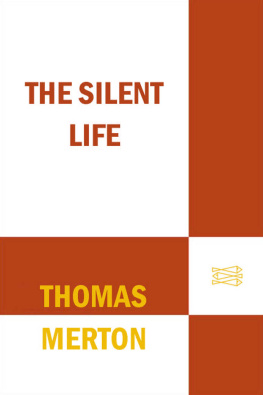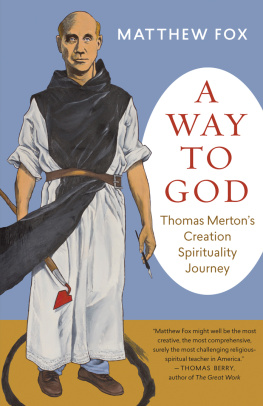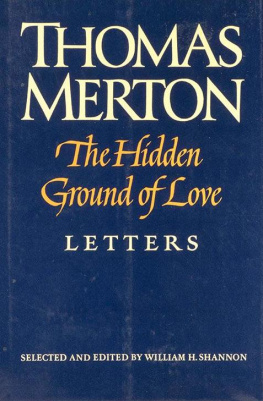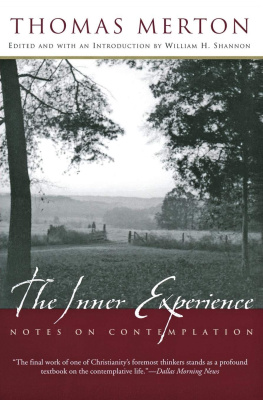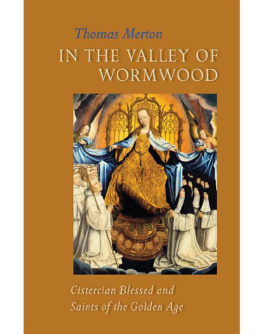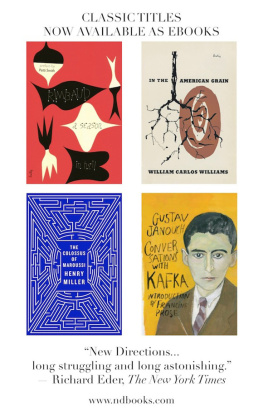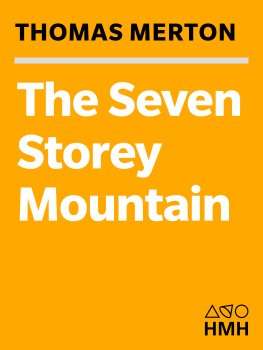Gordon Mary - On Thomas Merton
Here you can read online Gordon Mary - On Thomas Merton full text of the book (entire story) in english for free. Download pdf and epub, get meaning, cover and reviews about this ebook. City: United States, year: 2019;2018, publisher: Shambhala, genre: Religion. Description of the work, (preface) as well as reviews are available. Best literature library LitArk.com created for fans of good reading and offers a wide selection of genres:
Romance novel
Science fiction
Adventure
Detective
Science
History
Home and family
Prose
Art
Politics
Computer
Non-fiction
Religion
Business
Children
Humor
Choose a favorite category and find really read worthwhile books. Enjoy immersion in the world of imagination, feel the emotions of the characters or learn something new for yourself, make an fascinating discovery.

- Book:On Thomas Merton
- Author:
- Publisher:Shambhala
- Genre:
- Year:2019;2018
- City:United States
- Rating:5 / 5
- Favourites:Add to favourites
- Your mark:
- 100
- 1
- 2
- 3
- 4
- 5
On Thomas Merton: summary, description and annotation
We offer to read an annotation, description, summary or preface (depends on what the author of the book "On Thomas Merton" wrote himself). If you haven't found the necessary information about the book — write in the comments, we will try to find it.
On Thomas Merton — read online for free the complete book (whole text) full work
Below is the text of the book, divided by pages. System saving the place of the last page read, allows you to conveniently read the book "On Thomas Merton" online for free, without having to search again every time where you left off. Put a bookmark, and you can go to the page where you finished reading at any time.
Font size:
Interval:
Bookmark:
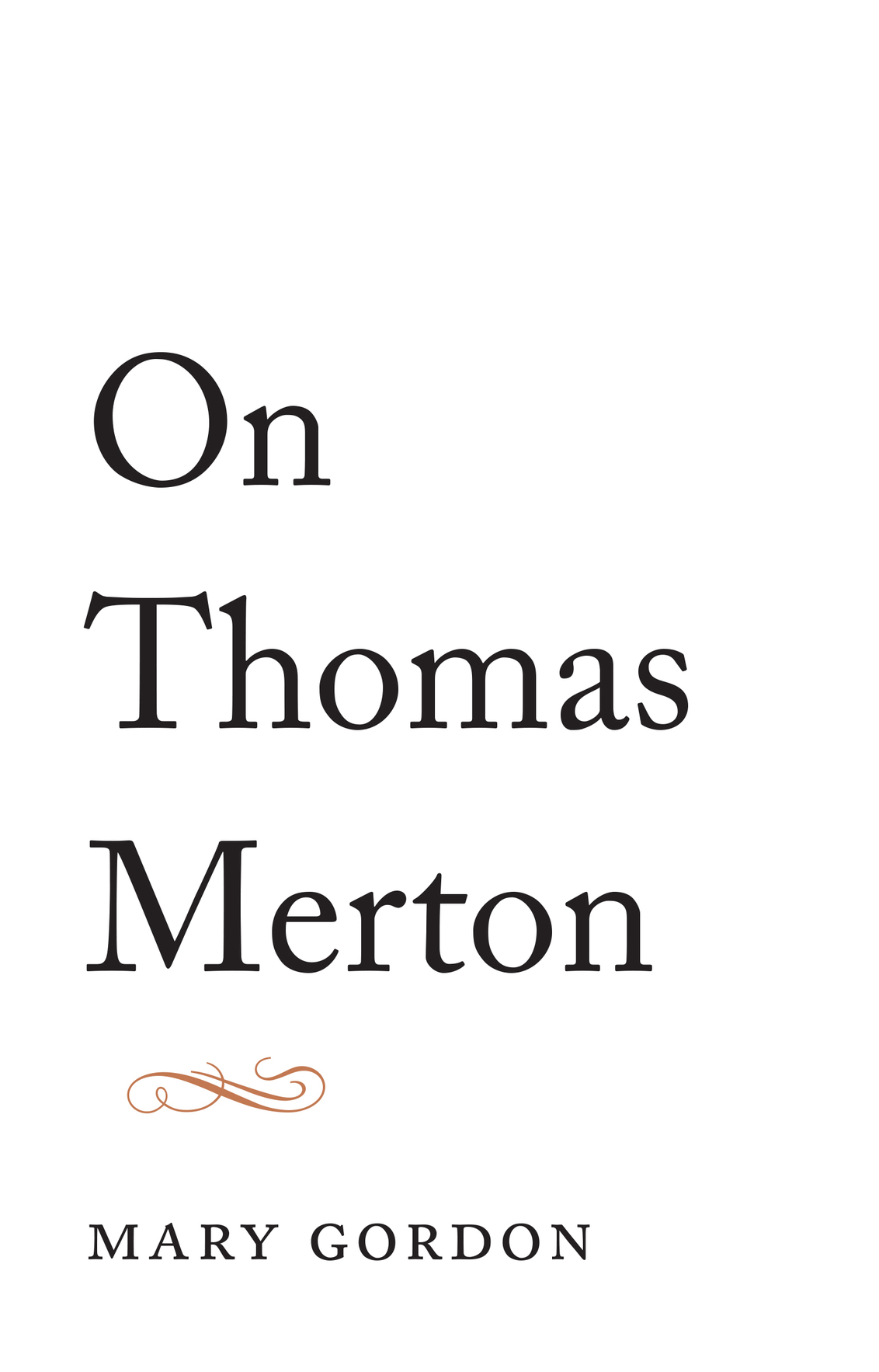
Also by Mary Gordon
NONFICTION
Reading Jesus: A Writers Encounter with the Gospels
Circling My Mother
Joan of Arc: A Life
The Shadow Man: A Daughters Search for Her Father
FICTION
There Your Heart Lies
The Liars Wife
The Love of My Youth
Pearl
The Other Side
The Company of Women
Final Payments
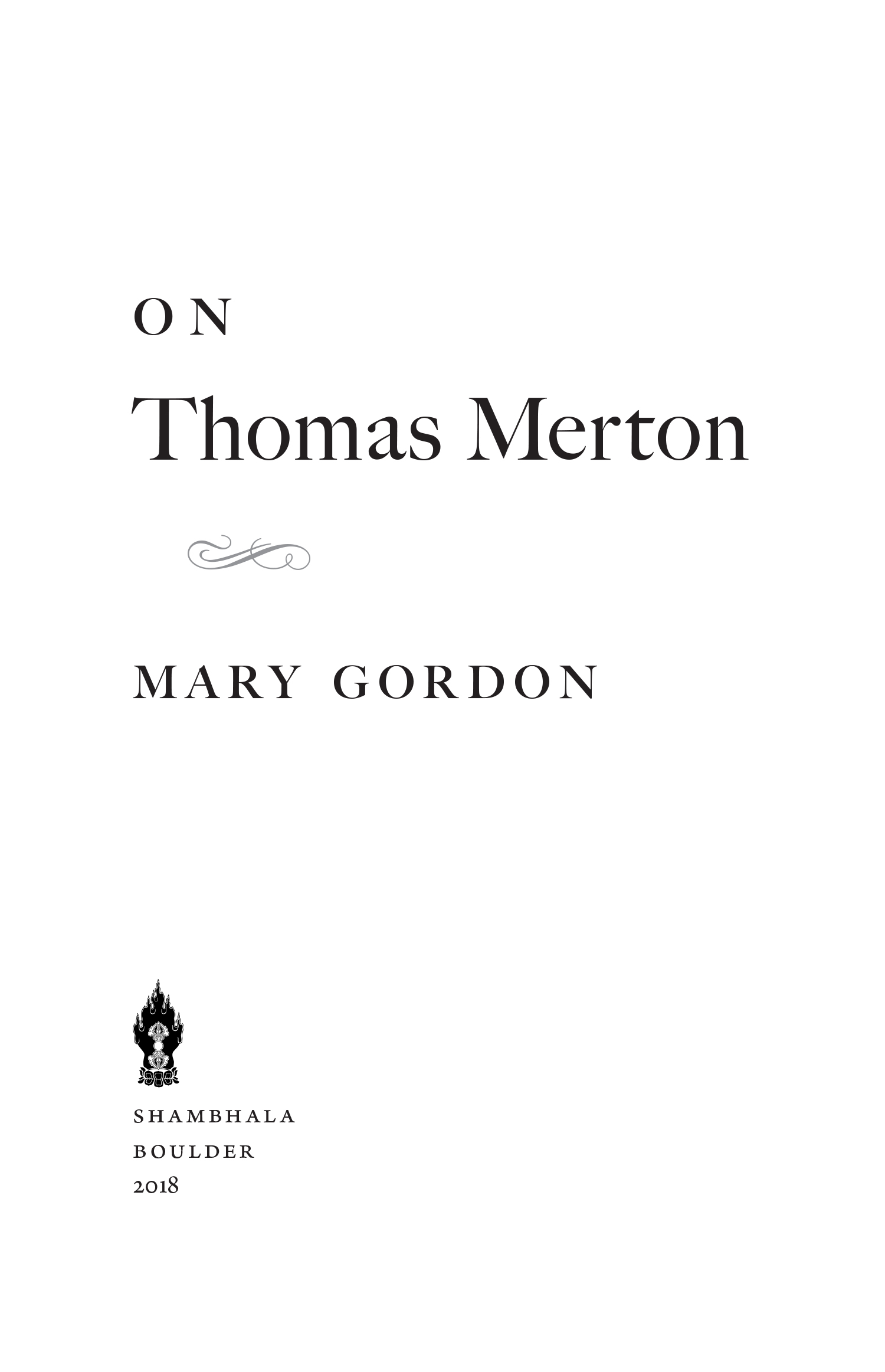
Shambhala Publications, Inc.
4720 Walnut Street
Boulder, Colorado 80301
www.shambhala.com
2018 by Mary Gordon
constitute a continuation of the copyright page.
All rights reserved. No part of this book may be reproduced in any form or by any means, electronic or mechanical, including photocopying, recording, or by any information storage and retrieval system, without permission in writing from the publisher.
Ebook design adapted from printed book design by Steve Dyer
Cover design by Graciela Galup
L IBRARY OF C ONGRESS C ATALOGING-IN -P UBLICATION D ATA
Names: Gordon, Mary, 1949 author.
Title: On Thomas Merton / Mary Gordon.
Description: First Edition. | Boulder: Shambhala, 2018. | Includes bibliographical references.
Identifiers: LCCN 2018011396 | ISBN 9781611803372 (hardcover: alk. paper)
eISBN9780834841857
Subjects: LCSH : Merton, Thomas, 19151968.
Classification: LCC BX 4705. M 542 G 67 2018 | DDC 271/.12502dc23
LC record available at https://lccn.loc.gov/2018011396
v5.3.2
a
For Celia Deutsch
I F T HOMAS M ERTON had been a writer and not a monk, we would never have heard of him. If Thomas Merton had been a monk and not a writer, we would never have heard of him.
Mertons dual identity contained within itself a particular irony: in becoming a Trappist, he entered an order devoted to silence, and yet his vocation was based on words.
For many years, more than fifty, I wasnt interested in Thomas Merton as a writer, because what Id read of him had no resonance with me. The first spiritual book I was ever given was Seeds of Contemplation, which I received as a confirmation gift in 1960 when I was eleven. I was much too young for it, though I had made my way through many books I was too young for. But Seeds of Contemplation tempted me not at all. It seemed dry and excessively abstracthaving nothing to do with my religious life, which was intense but attracted to the highly colorful. I read The Seven Storey Mountain in high school (I think it was 1965), but I already had one foot out the door of the church (I walked in the door again, but that was nearly two decades later), and I was turned off by his excoriation of the fleshpots of New York, which I was heading for like a heat-seeking missile. Later, when I became involved in the antiVietnam War movement, I was drawn to Merton as a symbol of the best that progressive, politically engaged Catholicism might be, but that didnt mean I thought I had to read past my early indifference.
On the one hand, I came to Merton through a series of accidents; on the other, my encounter with Merton was, it would seem, fated. The connections were numerous. First of all, Columbiahe at Columbia College, I at Barnard, both of us feeling we had found paradise in Morningside Heights. My first editor was Anne Freedgood, the widow of Seymour Freedgood, one of Mertons closest friends. Merton and I shared a parish: Corpus Christi on 121st Street. Another connection is that among my fathers possessions when he died in 1957 was a copy of Mertons collection of poems The Tears of the Blind Lions, published the year of my birth. My fathers translation of one of Mertons French poems is stapled to the soft-blue back cover.
And then, on the occasion of Mertons one hundredth birthday, the Columbia Rare Book and Manuscript Library planned an exhibition of his papers, and I was asked to give a lecture opening the event, probably because I was the only literary person on the Columbia campus known to be a practicing Catholic. Something in me jumped at the invitation. Which was odd, because it involved a lot of a work, as I had a lot of catching up to do. My approach was to trace Mertons connection to the French Catholic cultural revival of the first quarter of the twentieth century. Two of the artists of this periodGeorges Bernanos and Francis Poulencas well as one of their slightly earlier forbears, Charles Pguy, had a special place in my understanding of myself as an artist.
I placed Merton in a period when Catholicism was intellectually and aesthetically chic. The novels of Franois Mauriac and Georges Bernanos, the paintings of Georges Rouault, and Gregorian chant and Thomistic philosophy were at the center of the cultural conversation from the 1920s through the 1950s. During this time, Europes traditions were either eroding or being revitalized. The Catholic cultural revival began, I believe, as one of many responses to the shock of the First World War. In the immediate postwar years, there was a heady crop of intellectually distinguished converts. In France, Jacques Maritain converted and led the revival of Thomistic philosophy; in England, G. K. Chesterton made conversion seem convivial; they were followed in the early 1930s by Evelyn Waugh and Graham Greene. Half a generation later, there appeared a new group of converts drawn to the church by the havoc of the Depression and the triumph of Fascism. In France, there was Max Jacob and Simone Weils approach-avoidance dance. In America, Dorothy Day made the revolutionary connection between Catholicism and left-wing social justice movements; somewhat later, Robert Lowell converted, although he later abandoned Catholicism wholesale. Merton joined the ranks of these illuminati in 1937.
I prepared for my talk on Merton by approaching him in this indirect way. And in my spare time I read Mertons journals for the first time, all seven volumes, which had sat unopened on my shelf for years. And then, like so many before me, I fell in love. But was I in love with a writer or a personality?
Soon after I gave the lecture, Shambhala Publications contacted me about writing this monograph, and I accepted with eagerness. But I kept asking myself, Why me? As I became aware of the mass of books and articles written about Merton, the question became more pressing. And I could only answer it in one way: I am a writer. I wanted to write about him, writer to writer.
We are talking about Thomas Merton, and as is the case with all questions about Thomas Merton, the answer is not simple; it is complex to the point of being self-contradictory.
The journals present us with a person who is above all volatile, alternately tormented and ecstatic, but I feel most deeply his conflicted anguish about his role as a writer and a monk. His situation was unique in the starkness of terms set by his being a Trappist, but his conflicts are a supersaturated, or perhaps super-distilled, form of the conflict that strikes every artist: the conflict between being an artist in solitude and being a human in the world. Most writers have to struggle with the questions, What and when should I publish? Why do I write? What is the relationship of what I write to those I live among? What is the relationship of what I write to the money it might engender? For writers who have achieved fame: How do I escape the essential unreality that fame engenders? And for a writer with a moral consciousness and a concern about his or her writing in relation to the suffering of the world, there is the problem of the relationship of witness to aesthetic perfection.
Font size:
Interval:
Bookmark:
Similar books «On Thomas Merton»
Look at similar books to On Thomas Merton. We have selected literature similar in name and meaning in the hope of providing readers with more options to find new, interesting, not yet read works.
Discussion, reviews of the book On Thomas Merton and just readers' own opinions. Leave your comments, write what you think about the work, its meaning or the main characters. Specify what exactly you liked and what you didn't like, and why you think so.

